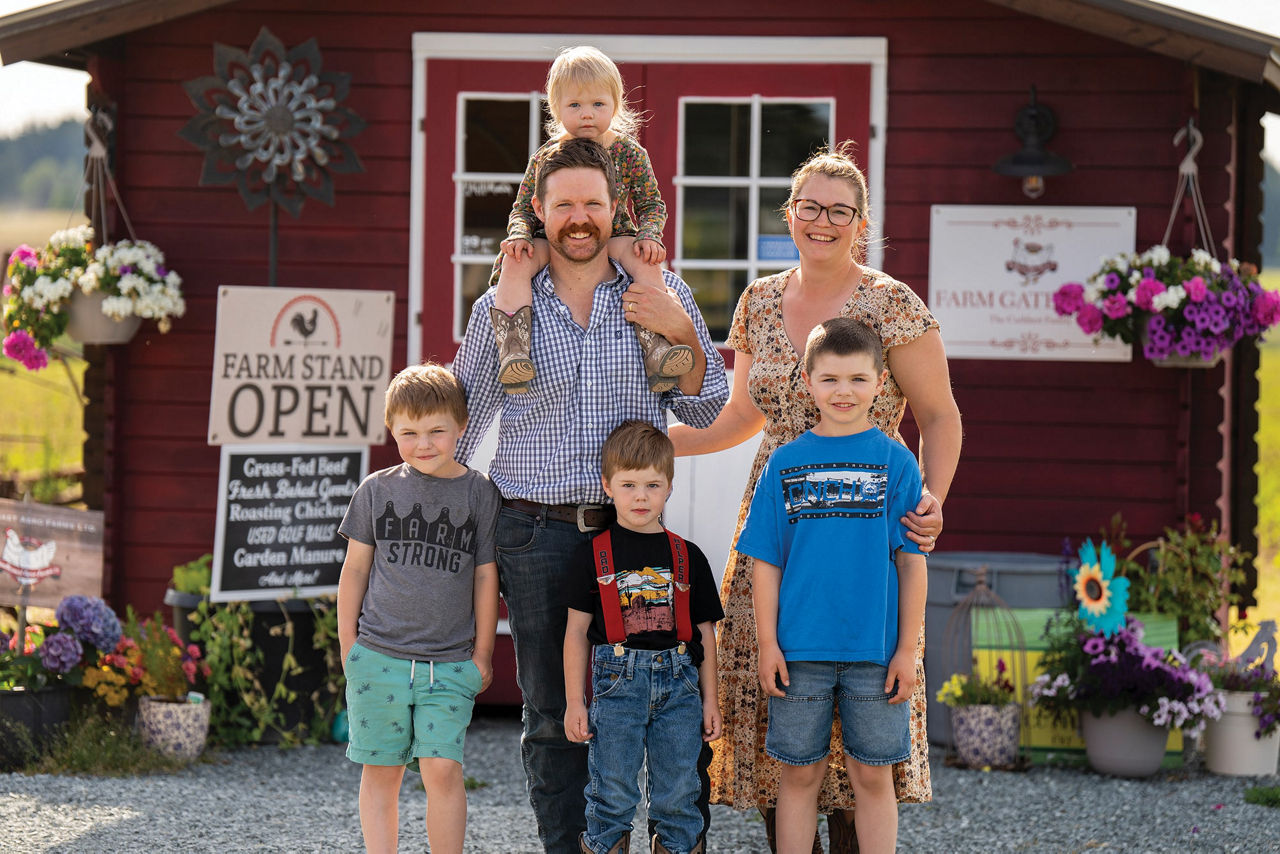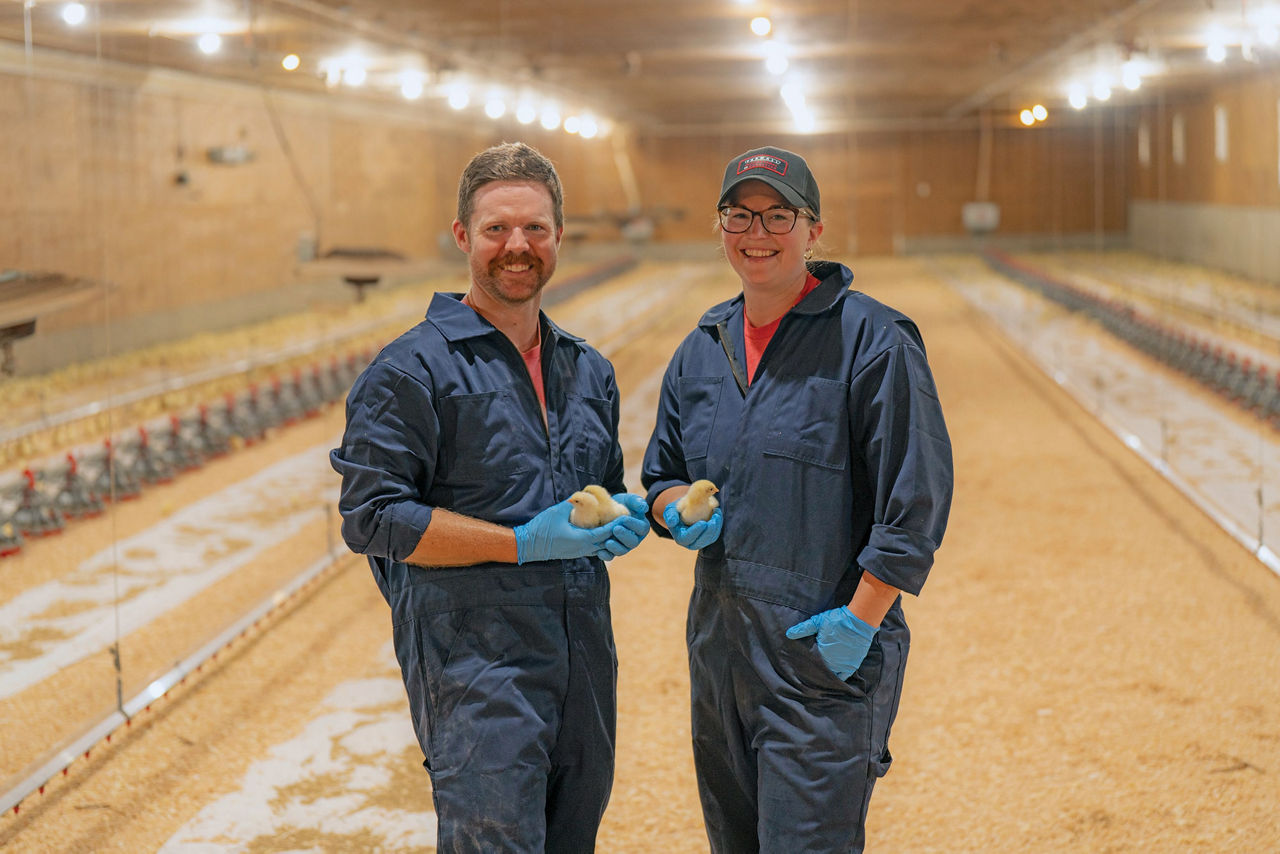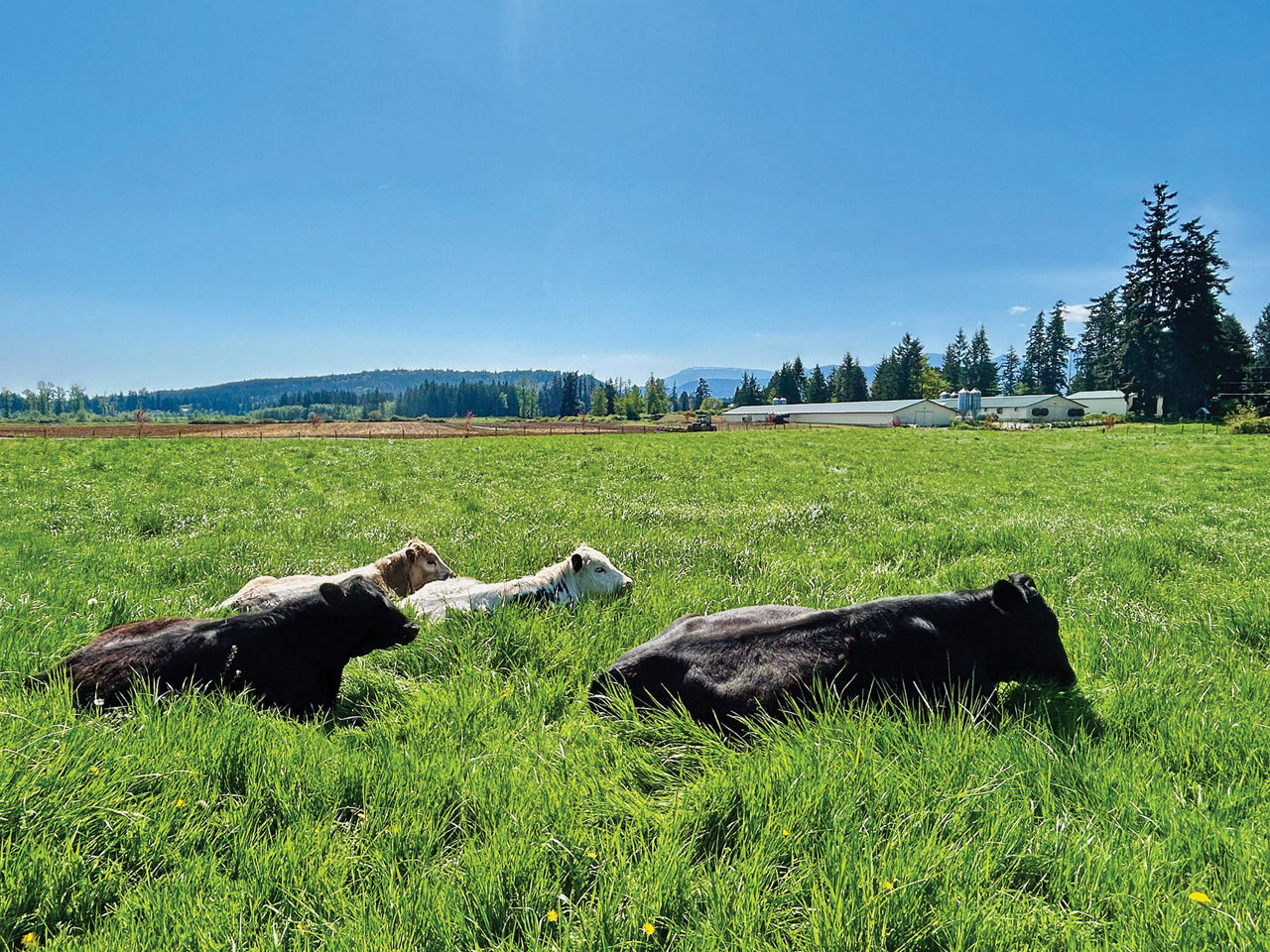Catering to the needs of their local market spells success for this BC couple
October 24, 2025

By Jennifer Barber
To describe the life of Catherine and Thomas Cuthbert as “busy” seems wholly inadequate. These fourth-generation farmers from Ladysmith, BC, have an almost inconceivable number of balls in the air but they are so comfortable juggling them, they want to add more.
The Cuthberts raise 240,000 to 280,000 free-run broiler chickens per year (six to seven cycles of 40,000 birds each), plus they add a flock of free-range chickens in the warmer summer months. They also run a small herd of grass-fed beef cows and operate a farm gate shop. On top of that, they help run a 115-head dairy herd on adjacent property that belongs to Thomas’s parents. Oh, and they’re raising four children under the age of eight.
All this production occurs on a fairly small land base, about 400 acres, which is comprised of a 70-acre plot with two chicken barns, 10 acres of pasture for the cattle and 45 acres of field corn for feed, plus the neighbouring half section belonging to Thomas’s parents, which makes up the dairy.
Both Thomas and Catherine come from farming backgrounds. Thomas grew up on his parents’ dairy farm, and Catherine on her family’s grass-fed beef farm. Thomas started raising around 3,600 chickens in 2007 as part of the BC Chicken Marketing Board’s New Entrant Grower Program, which supports those entering the industry. They began raising free-range roasting chickens in 2018 and, given Catherine’s background, they expanded into grass-fed beef production in 2022.
They’ve kept their focus local. “We sell into the Vancouver Island market, so we know what our community is looking for, which has helped us decide where to grow,” says Catherine of the couple’s farm expansion choices, in particular, their free-range roasters. “Our birds are between six and eight pounds, and sometimes up to 10 pounds,” says Thomas. “Those larger chickens have become more popular in recent years and can be difficult to find, so it’s a unique market we’re trying to fill.”
“We work with a local processor for our free-run broiler chickens,” adds Catherine, “and self-market our larger free-range roasting chickens, grass-fed beef and baked goods, which serve a local niche market.”

Bringing customers to the farm
Self-marketing is a big part of the Cuthberts’ business, and it speaks to their ability to see and seize opportunity.
“A few years back we decided to set up a farm stand as we were having more visitors to the farm asking about our products,” says Catherine. “We started selling out of our freezer in our garage, then we set up a tent at the farm gate for summer sales and now we have a structure set up, our little farm gate shop, to sell our products throughout the year, which pairs well with the rest of our operation.”
Catherine, who has her Red Seal for Professional Baking and Pastry Arts, creates seasonal treats using fresh, local, high-quality ingredients. They also butcher a couple beef steers every few months for the farm shop, sell some of the seasoned and prepared chickens from Island Farmhouse Poultry, along with chicken pieces from their free-run birds.
They say that their experience with the farm shop has made them more passionate about getting more involved in their community. They don’t feel they need to go to farmers’ markets, as sales from their own shop continue to rise and they like the experience of bringing people to their farm.
“One day we would love to have a building with a certified professional kitchen, but that is down the road,” says Catherine. “In addition to baking, we would love to pursue selling our milk through a milk dispenser and possibly selling other dairy products at the farm gate one day as part of a larger effort to show people where their food comes from.”

Island farming: challenges and opportunities
While the south Nanaimo area of Vancouver Island is typically known for its focus on environmental concerns rather than agriculture, it is no stranger to farming.
“This area of the Island is very rural, and it has its fair share of commercial farming,” says Thomas. “In addition to our farm, there is a blueberry farm, cattle farming and other smaller producers. We get questions about our farm and our farming practices from those checking out our shop, from visiting schools — even from local vegetarians — and they all are interested and supportive of what we do.”
Thomas says one of the biggest challenges running a commercial farm on the Island is access to equipment and feed. Many supplies must be shipped from the mainland, while equipment repairs and maintenance can present an added level of complexity.
“We have to make sure we have planned out everything as much as possible when it comes to new equipment and repairs,” he says. “Bringing in feed from the mainland is more costly, but we have been able to achieve good feed conversion ratios to help keep us competitive. We also have less disease pressure on the Island, which is also beneficial.”
What comes next
As part of their family succession plan, the Cuthberts will be swapping houses with Thomas’s parents as they gradually transition into retirement. This will allow the couple fully take over management of the dairy. “If you leave dairy cattle alone too long they can get up to no good,” jokes Thomas before adding that the poultry operation can be more easily managed from down the road, particularly with soon-to-be-installed cameras in the barns and daily walk throughs.
The Cuthberts have lots of plans for the future — when time allows. “We want to continue to naturally expand the beef herd to meet demand,” says Thomas. “We are working towards butchering two animals every two months and will grow as needed. There is a real market here on the island for naturally raised, grass fed beef.”
Some of their most ambitious plans are for the dairy. They are presently installing a new automatic calf feeder, the first of its type in BC, which is more efficient and represents a big step up for the business. The Cuthberts are also working on their breeding program with an aim to produce milk that is easier to digest.
“Most dairy cattle today produce milk with both A1 and A2 proteins,” says Thomas. “It’s a stable milk supply but can be more difficult to digest. By breeding cattle that only have the A2 protein, this milk can be more easily digested for some of those who have dairy sensitives, which we think could be a game changer.”
Right now, the two of them manage the chicken operation, and they employ two full-time and one part-time employees at the dairy. Their kids are 8, 6, 4 and 2, and this fall three of them will be in school during the day, easing up a bit of the daily time pressure.
Thomas and Catherine were nominated for the 2025 Outstanding Young Farmers Program award by friends in the industry who admire their approach to farming. As regional winners, the Cuthberts are second generation recipients, with Thomas’s parents winning in 1996.
“My parents encouraged us, as they have been very involved with the organization since they won,” says Thomas. “They said the connections they made, and the networking opportunities presented helped them both with their business outlook and with making lifelong friends. We are looking forward to representing the BC and Yukon region at nationals.
Read the full issue of Farm Forum here.
